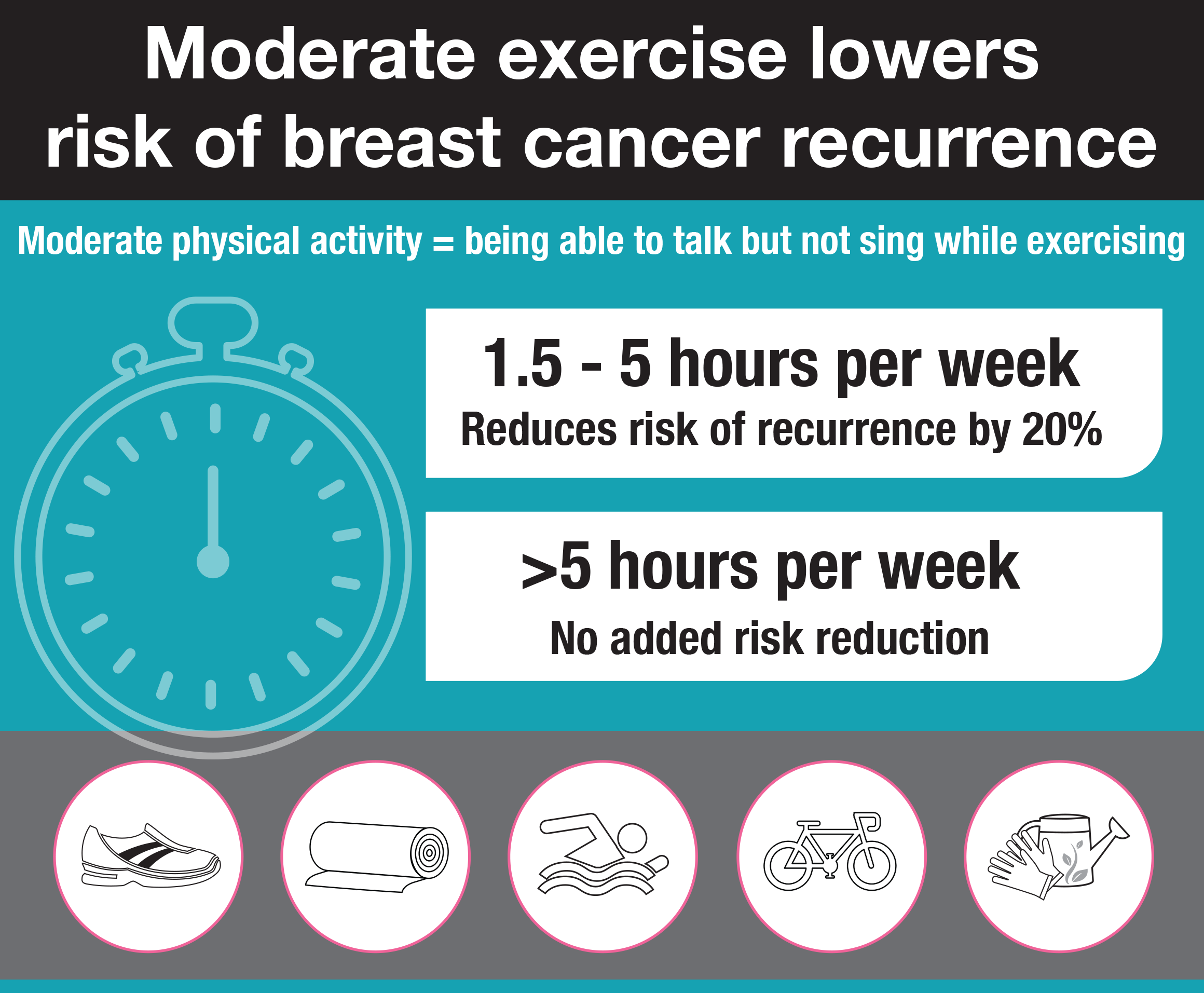Study: Moderate exercise delays time to breast cancer recurrence
For premenopausal women with early-stage breast cancer, physical activity may increase the time before cancer returns and spreads. In this study, people with hormone receptor-negative (HR-negative) breast cancer benefited from moderate exercise—more than those with hormone receptor-positive (HR-positive) breast cancer. This study found that outcomes improved when weekly exercise time was between 90 minutes and 5 hours. (Posted 11/14/24)
Este artículo está disponible en español.

RELEVANCE
Most relevant for: People with breast cancer who are interested in using exercise to reduce risk of recurrence.
It may also be relevant for:
- people with breast cancer
- people with Her2-positive cancer
- people with triple negative breast cancer
- people newly diagnosed with cancer


Relevance: Medium-High


Strength of Science: Medium-High


Research Timeline: Post Approval
What is this study about?
This study looks at the impact of exercise on the risk of distant recurrence () in premenopausal and postmenopausal women with different types of breast cancer. Researchers looked at how often participants exercised each week to determine if more exercise more effectively reduces risk.
Why is this study important?
breast cancer is often treatable. Yet, even with successful treatment, some breast cancers come back, often in other organs. breast cancer (cancer that returns and spreads) is typically much harder to treat. The uncertainty of whether or when this might happen can cause anxiety.
In addition to treatment, people who have had breast cancer are often willing to make changes in their lifestyles to prevent the disease from coming back. For this reason, studies that look at the effects of diet, exercise and other lifestyle changes are of high importance to people with breast cancer.
Exercise, in particular, is a significant topic of research in breast cancer. Studies have shown its value in improving quality of life, managing side effects, preventing and delaying death. Continued research on whether exercise can prevent cancer from returning and spreading is needed.
Study findings
A moderate amount of exercise may help prevent breast cancer (stages 1-3) from coming back in premenopausal women, especially those with HR-negative breast cancer. The study tracked the time before the cancer returned and spread.
This study included 10,359 people in France with 1, 2 or 3 breast cancer who were followed up to six years after diagnosis. Their average age was 56. Some participants were smokers and some were non-smokers. Most had been treated with hormone therapy and more than half were treated with chemotherapy.
Participants completed a questionnaire and self-reported exercise during their study visits (Global Physical Activity Questionnaire-16). The study team conducted the questionnaire with participants and then measured the amount of exercise reported. The amount of exercise was tracked in metabolic task hours/week. The metabolic equivalent (MET) count for each person is based on the rate at which they expend energy relative to their mass while performing some specific physical activity. For example, a score of 1 indicates inactivity, while a score of 3.5 indicates leisurely biking. The higher the MET count, the greater the intensity of the workout.
Researchers found that:
- Moderate, weekly exercise benefited premenopausal women with HR-negative breast cancer.
- Participants with HR-negative, breast cancer saw the greatest benefit. Their risk of distant recurrence was 63% lower during the study period.
- Participants with had a 41% lower risk of distant recurrence.
- People who benefited reported exercising between 90 minutes to 5 hours each week.
- Exercising more than 5 hours per week did not add benefit for participants, including people who had already gone through menopause.

Although a significant benefit for people with HR+ breast cancers was not found, the researchers mention that this could be because HR+ participants were not followed long enough. Additional research on this topic would be beneficial.
What does this mean for me?
If you have HR-negative breast cancer and have not gone through menopause, regular moderate exercise may help prevent breast cancer from coming back. If you currently have breast cancer or have had breast cancer in the past, including weekly exercise in your schedule is beneficial.
Exercise has additional benefits beyond cancer. Including moderate exercise in your weekly schedule can help improve your heart health and overall health, both mentally and physically.
Speak with your healthcare provider to make sure that the intensity level of your exercises is ideal for you.
Reference
Soldato D, Michiels S, Havas J, et al. Dose/exposure relationship of exercise and distant recurrence in primary breast cancer. Journal of Clinical Oncology. 2024; 42:3022-3032.
This project was supported by the Cooperative Agreement Number, NU58DP007909, funded by the Centers for Disease Control and Prevention. Its contents are solely the responsibility of FORCE and do not necessarily represent the official views of the Centers for Disease Control and Prevention or the Department of Health and Human Services.
Disclosure: FORCE receives funding from industry sponsors, including companies that manufacture cancer drugs, tests and devices. All XRAYS articles are written independently of any sponsor and are reviewed by members of our Scientific Advisory Board prior to publication to assure scientific integrity.
Share your thoughts on this XRAY review by taking our brief survey.
posted 11/14/24
The National Comprehensive Cancer Network and the American Cancer Society have recommendations for physical activity for cancer survivors:
- Physical activity and exercise recommendations should be tailored to each person's abilities and preferences.
- People should try to engage in some physical activity daily; this may include:
- taking the stairs.
- walking more.
- Each week, people should try to achieve the following:
- At least 150 minutes of moderate-intensity exercise or 75 minutes of vigorous activity (or a combination), with an ideal goal of 300 minutes of moderate-intensity or 150 minutes of vigorous activity.
- Two to three sessions of strength/resistance training that include all of the major muscle groups (chest, shoulders, arms, back, core and legs).
- Stretch major muscle groups at least two days per week. in addition to stretching before exercise using those muscles groups.
- Avoid sitting or lying down for long periods and other prolonged sedentary behavior. Consider standing for tasks like talking on the phone, using the computer or watching TV.
Updated: 10/20/2025
- The Livestrong at the YMCA program includes a free 12-week membership and fitness training with certified exercise experts. You can search by zip code for a program near you.
- The American Medical Society for Sports Medicine (AMSSM) maintains a database of qualified, non-surgical sports medicine experts.
Updated: 10/17/2025